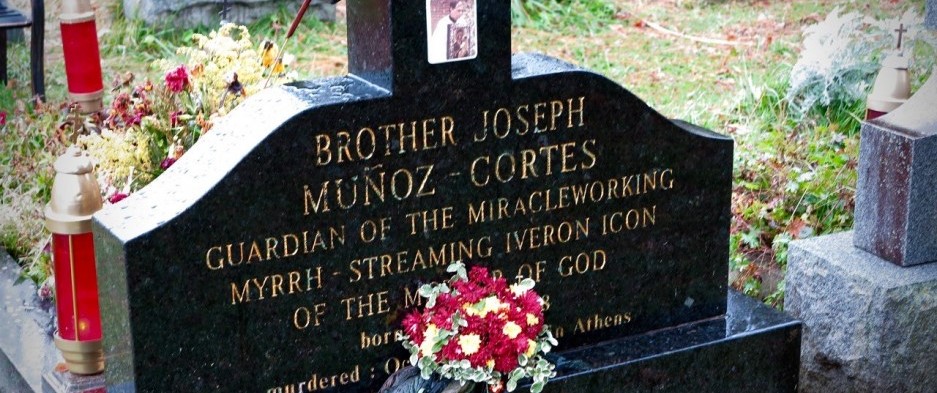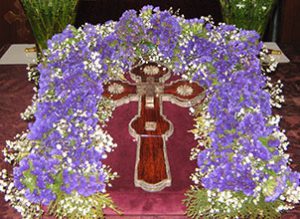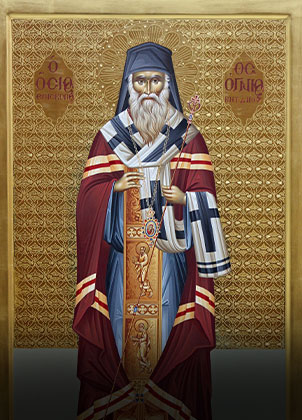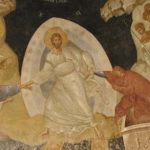Кто были убийцы Брата Иосифа?
Настала 20-ая годовщина мученической смерти Брата Иосифа Муньоза, и снова возникает вопрос: Кто же были его убийцы?
На сегодняшний день это остается тайной, и возможно, мы узнаем это только тогда, когда «Господь откроет тайная тьмы» (1 Кор. 4,5).
Однако, обстоятельства смерти Брата Иосифа, наводят на мысль, что его убийство было непосредственно связано с подготовкой объединения РПЦЗ с МП.
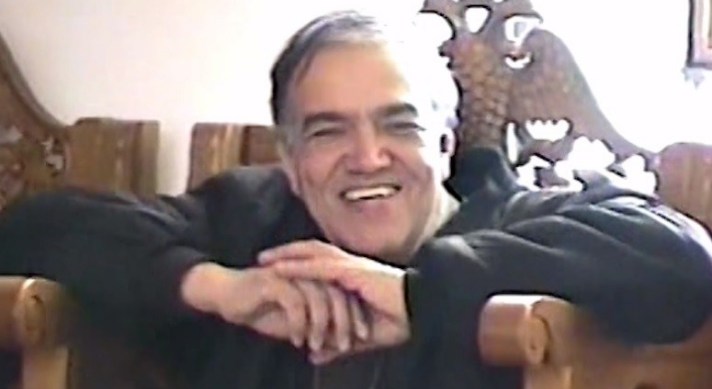
Проанализируем факты. Прежде всего, это было политическое убийство, т.к. убийцы не преследовали иной цели кроме его физического устранения. Это была прекрасно спланированная и безупречно исполненная операция. Место убийства было выбрано очень удобное. Понятно, что в Америке или Канаде преступникам было бы гораздо труднее исполнить свой замысл и скрыться. Организаторы убийства несомненно знали о намерении Брата Иосифа посетить Грецию, и исходя из этого составили свой план. Уже в Греции за Братом Иосифом велась слежка; ожидали момента, когда о. Александр Ивашевич, путешествовавший с Братом Иосифом, улетит в Аргентину, и Брат Иосиф останется один. Его заманили в номер гостиницы, где его ждали убийцы, проникшие туда через балкон. В планы входило и то, чтобы попутно опорочить доброе имя Брата Иосифа. Можно также упомянуть о попытке устрашения делегации из Америки, прибывшей на суд год спустя.
Все перечисленное указывает на то, что убийство было совершено высоко-профессиональной, мощной, разветвленной организацией, обладающей достаточными людскими и финансовыми ресурсами.
Из всех существующих организаций такого рода наиболее естественно заподозрить КГБ. Но чем Брат Иосиф мог мешать чекистам?
Агенты КГБ в течение десятилетий трудились над установлением идеологического контроля над русской эмиграцией. В некоторые исторические моменты они достигали в этом значительного успеха, однако независимая Зарубежная Церковь всегда оставалась препятствием на их пути. В конце 90-х годов стало реальным устранить это препятствие. Начался последний виток операции КГБ по поглощению РПЦЗ. В декабре 1996 г. архиеп. Марк открыто встретился с патр. Алексием в Москве, что вызвало глубокий шок у всей РПЦЗ. Вл. Митр. Виталий направил ему резкое письмо, но он был уже 85-летним старцем, возжи выпадали из его рук, и его уже не боялись.
Поглощение РПЦЗ стало возможным потому, что у нее не оставалось авторитетных духовных лидеров, способных противостать провокаторам из МП. Не будет преувеличением сказать, что единственным духовным авторитетом, уважаемым всеми в РПЦЗ, был смиренный, старавшийся оставаться незаметным, Брат Иосиф Муньоз.
Если бы удалось привлечь Брата Иосифа на сторону объединителей, это было бы решающей победой, но если бы, напротив, он встал в оппозицию соединению с МП, то оно просто не могло бы состояться.
Можно предположить, что КГБ работал с Братом Иосифом, изучал его характер и его слабые стороны. Однажды на парижской улице его остановил некто, показавший удостоверение работника КГБ. Он сказал Брату Иосифу: «Вы нам мешаете. Вы знаете? Вы нам мешаете». (По рассказу одного из друзей Брата Иосифа). Возможно, были и другие попытки устрашения.
Нельзя было приступить к последней фазе операции по объединению, пока оставалось неясным, на чьей стороне будет Брат Иосиф. Было необходимо или привлечь его на свою сторону, или устранить его прежде, чем начнется объединительный процесс. Если бы пришлось устранить Брата Иосифа уже после того, как начался процесс объединения, то многие объяснили бы его смерть тем, что он встал в оппозицию к МП. Этого нельзя было допустить. Таким образом, Брат Иосиф был поистине «удерживающим», которого было необходимо «взять от среды», чтобы «тайна беззакония» могла завершить свое дело. (2 Фес. 2,7)
Об отношении Брата Иосифа к Московской Патриархии можно судить по его собственным словам. Отвечая на вопрос о возможности объединения с Церковью в России, Брат Иосиф сказал:
«Я лично не осуждаю других людей. У меня самого много недостатков. Я молюсь за объединение Церкви и прошу Божию Матерь, чтобы это осуществилось без всякого компромисса, ереси, экуменизма и политического контроля. Когда это осуществится, наступит славный день для всей Церкви».
Брату Иосифу был чужд дух партийности и фанатизма. Очевидно, он в принципе не отрицал возможность объединения, но только «без всякого компромисса, ереси, экуменизма и политического контроля».
Будучи человеком мудрым и проницательным, он при этом сохранял детскую искренность, простоту и смирение. Невозможно даже представить себе Брата Иосифа, участвующим в таком объединительном процессе, какой мы наблюдали, т.е. от начала до конца построенном на подлоге, демагогии и наглом насилии над Церковью.
В октябре 1995 г. Брат Иосиф находился с Мироточивой иконой в Болгарии. Это было великое торжество. Десятки тысяч людей смогли поклониться чудотворному образу. Люди по нескольку часов стояли в очереди, чтобы приложиться к иконе и быть помазанными чудесным миром.
Вскорости после этого события от некоторых лиц из России было сделано предложение Брату Иосифу посетить с иконой Россию. Это предложение было сделано публично в печати. Брат Иосиф дал отрицательный ответ: «Икону в России должны встретить достойные люди».
В своем последнем интервью (журналу «Русский Пастырь» 1997. № 27.) Брат Иосиф так ответил на вопрос: почему икона до сих пор не посетила Россию.
«Думаю, что когда Мироточивая Икона поедет в Россию, наступит Пасха среди лета. Но, как я говорил раньше, чудо Мироточивой Иконы происходит в рамках Церкви. И пока у меня нет благословения Первоиерарха моей Церкви, Церкви, где появилось это чудо после прославления всех Новомучеников Российских, я не могу в Россию поехать против воли Первоиерарха. Это было бы непослушание. А в Церкви не может быть непослушания. Мы не можем тайно поехать в Россию, как тать и разбойник через окно. Мы должны войти в Россию через Царские Врата, которые нам откроют достойные люди». Т.е. Брат Иосиф не был согласен, чтобы икону в России встретили иерархи МП.
По-видимому, таким ответом он подписал себе смертный приговор.
В этом же последнем интервью Брат Иосиф вдруг стал говорить о мученической смерти: «Тот, кто будет верен в малом, тот будет верен в великом, когда потребуется. При возможности стать исповедниками, мы не должны это упустить. Потеряв земную жизнь, обретаем небесную. Мы не должны бояться смерти за Христа».
Возможно, он предвидел, что его путь окончится мученичеством.
Еп. Андрей
Who killed Brother Joseph?
The 20th anniversary of the martyr death of Brother Joseph is upon us, and again the same question arises: Who were the people that killed him?
This remains unknown to this day and we may only learn the answer then, when “The Lord will bring to light what is hidden in darkness.” (1 Cor. 4,5)
However, the circumstances of Brother Joseph’s death leads one to think that his murder was directly involved with the plans to unite the ROCA and the MP.
Let us analyze the facts. First, this murder was politically motivated, as the killers had no other goal other than his neutralization. This was a well-planned and flawlessly executed operation. Convenience was the reason for deciding where the murder was to take place. Arguably, it would have been much harder for the perpetrators to execute their plan in America or Canada and then disappear. The planners of the murder certainly knew of Brother Joseph’s intention to visit Greece, which led to their scheme. Brother Joseph was being followed in Greece immediately and they waited for the moment when Fr. Aleksandr Iwaczewicz, who was traveling with Brother Joseph, would leave for Argentina and Brother Joseph would remain alone. They lured him into the hotel room, where the murders waited, having entered through the balcony. Part of the plan was also to smear the good name of Brother Joseph at the same time. It is important to also note the attempts to intimidate the delegation from America, which arrived at the court hearing a year later.
All these facts point to the fact that the murder was committed by a highly professional, powerful, far-reaching organization, with sufficient resources in people and money.
Of all such existing organizations, it is most likely to suspect the KGB. But how could Brother Joseph be any trouble to the chekists?
The agents of the KGB worked for decades to establish ideological control over the Russian émigré community. They achieved considerable success in several historic moments, yet the independent Church Abroad always remained an obstacle in their path. At the end of the 90’s, the removal of this obstacle became a real possibility, when the latest twist in the KGB’s operations in the takeover of the ROCA began. Archbishop Mark openly met with Patriarch Alexy in December, 1996, in Moscow, which caused a huge shock throughout all of the ROCA. Met. Vitaliy sent him a sharply-worded letter, but he was already an 85 year old elder, the reins were falling out of his hands, and he was no longer feared.
The takeover of the ROCA was possible because it no longer had any authoritative spiritual leaders, capable of resisting the provocateurs of the MP. It is not an exaggeration to say that the only spiritual authority respected by anyone in the ROCA, was the humble Brother Joseph Munoz, who tried to remain inconspicuous.
If Brother Joseph could be persuaded to join the side of those for union, that would be a decisive victory, but if the opposite occurred, and he would oppose union with the MP, it simply would not have happened.
It can be assumed that the KGB was monitoring Brother Joseph, learning his character and his weak points. He was stopped one time on a street in Paris by someone who showed his KGB identity card. He told Brother Joseph, “You are a bother to us. You understand? You bother us.” (One of Brother Joseph’s friends related this story.) It is possible that there were other attempts to frighten him.
It would not be possible to commence the final stages of the operation to unite the churches, while it remained unclear which side Brother Joseph would join. It became necessary to either attract him to their side, or eliminate him before the process of union began. If they would eliminate him after the process began, then many would say his death was a result of his opposing the MP. This could not be allowed to happen. As a result, Brother Joseph truly became “the one who restrained,” who had to be “taken out of the way” so that “the mystery of lawlessness” could complete its task. (2 Thes. 2,7)
Brother Joseph’s opinion of the Moscow Patriarchia can be gleaned from his own words. In answering a question about the possibility of joining with the Church in Russia, Brother Joseph said:
“I personally do not judge others. I have enough faults of my own. I pray for the union of the Church and ask the Mother of God that this be accomplished without any compromise, heresy, ecumenism and political control. When that is possible, a glorious day will dawn for the entire Church.”
Party affiliation and fanaticism were foreign to Brother Joseph. In principle, he apparently did not reject the possibility of union, but only “without any compromise, heresy, ecumenism and political control.”
Though he was a wise and astute person, he nevertheless harbored a childlike honesty, simplicity and humility. It is not possible to even imagine Brother Joseph participating in a process of union such as the one we observed, marked from beginning to end by fraud, demagoguery and a base coercion of the Church.
In October, 1995, Brother Joseph could be found with the Myrrh-Streaming icon in Bulgaria. It was a joyous celebration. Tens of thousands of people were able to venerate the miraculous icon. People stood in lines for hours to approach the icon and be anointed with the miraculous myrrh.
Soon after this event, the proposal was made by some in Russia for Brother Joseph to visit Russia with the icon. This proposal was made publicly in print. Brother Joseph declined, saying, “The icon must be met by worthy people in Russia.”
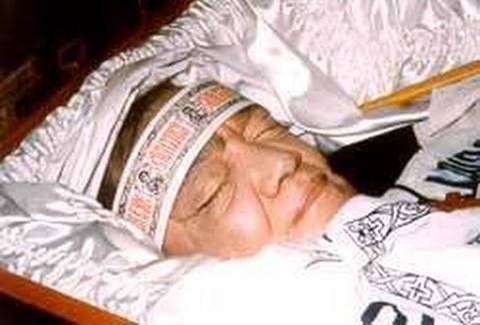
In his last interview (in the magazine “The Russian Pastor” –
Russkii pastyr’ 1997, #27), Brother Joseph answered the question of why the icon had not visited Russia yet in this way:
“I think that when the Myrrh-Streaming Icon goes to Russia, Pascha will occur in the summer. But as I have said before, the miracle of the Myrrh-Streaming Icon occurs within the framework of the Church. As long as I do not have the blessing of the First Hierarch of my Church, the Church in which this miracle appeared after the canonization of all the New Martyrs of Russia, I cannot travel to Russia against the will of the First Hierarch. This would be disobedience. And disobedience has no place in the Church. We cannot secretly travel to Russia, entering like a thief or a robber through the window. We must arrive in Russia through the Royal Gates, which will be opened there by righteous people.” That is, Brother Joseph could not agree to have the icon met in Russia by the bishops of the MP.
Apparently, with such an answer, he signed his own death warrant.
In this final interview, Brother Joseph also spoke of the martyr’s death, “He that is faithful in the least is faithful also in much, when it is required. If we are called to be confessors, we cannot turn away from it. Having lost our life on earth, we acquire life in heavenly. We must not fear losing our life for Christ.”
It is possible, that he foresaw that his path would lead to martyrdom.
Bishop Andrei

